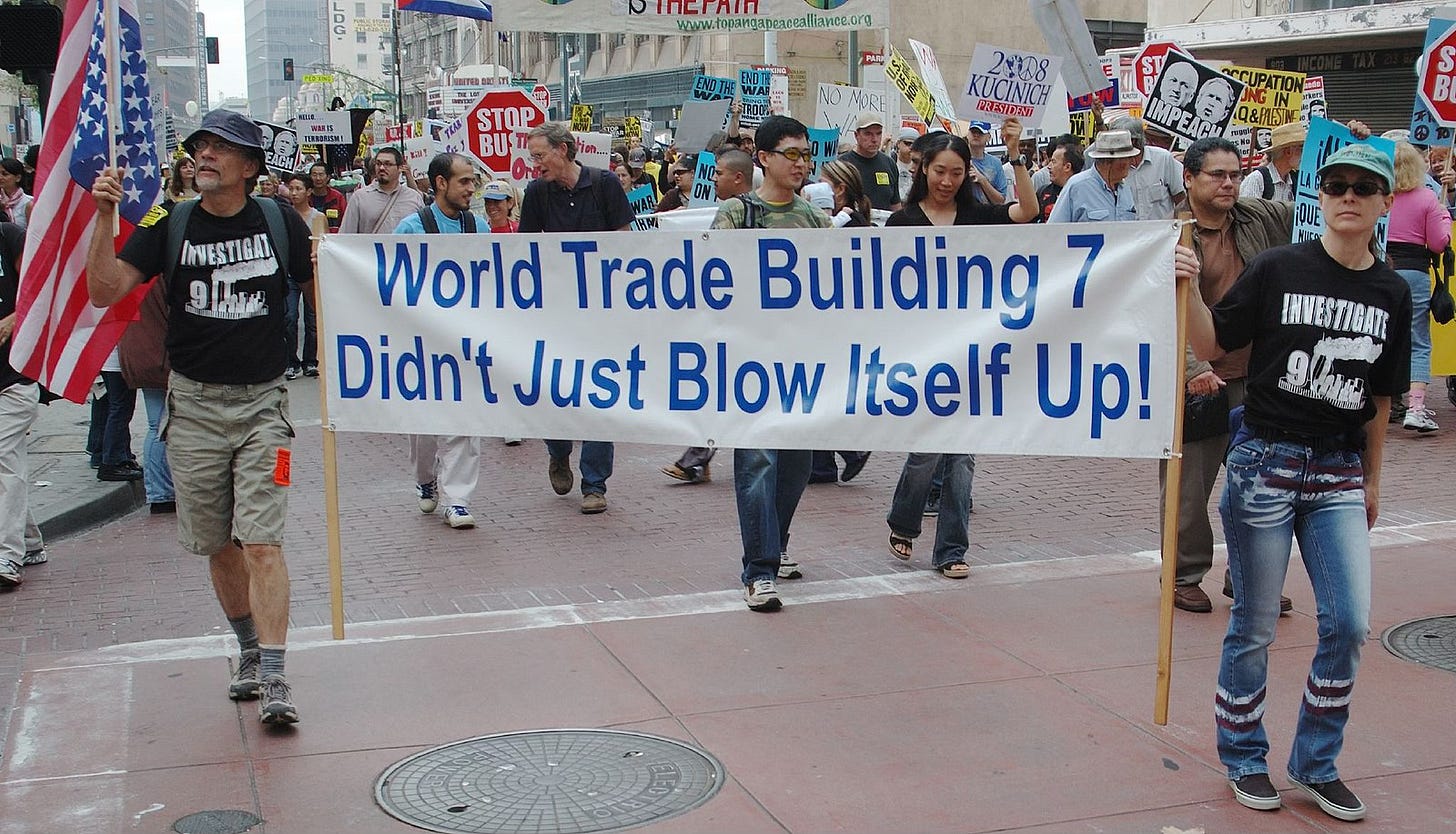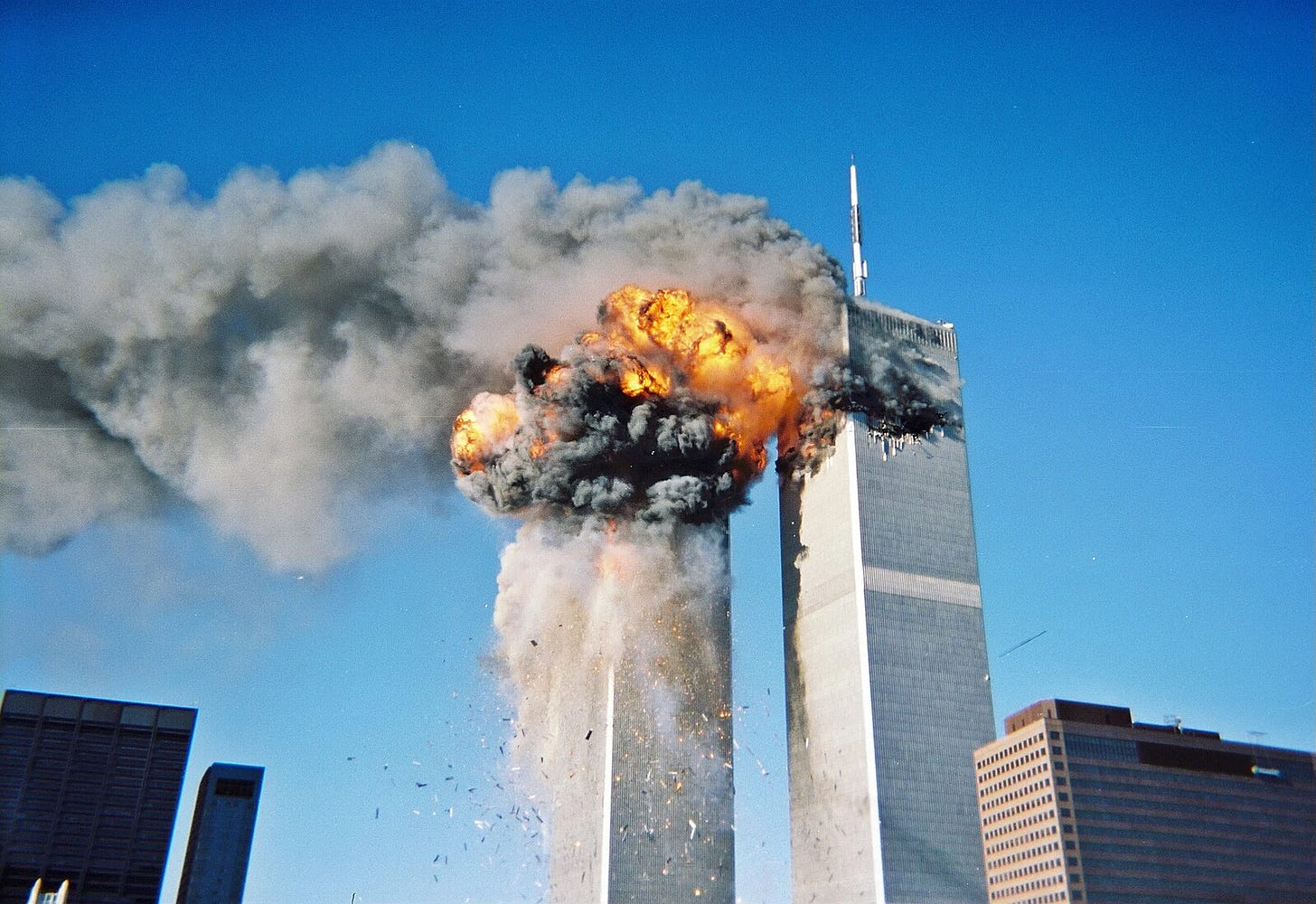Handling the Truth
There was a nostalgic quality to Senator Ron Johnson calling for a new investigation into 9/11. It took me back to a more innocent time, where instead of arguing about trans people and vaccines, politically-minded internet addicts argued about thermite and jet fuel.
9/11 conspiracy theories began on 9/11. On the day of the attacks, Alex Jones took to the airwaves to announce that there was a “98 percent chance this was a government-orchestrated controlled bombing”. Goodness knows how his in-house statistician had worked that out. Six months later, the French journalist Thierry Meyssan wrote 9/11 The Big Lie, which topped bestseller lists.
It was in 2005, after the release of the documentary Loose Change, that alternative theories really took off. Three young American men, who had created the first cut of the documentary for all of $2000, showed the power of new media with their intriguing and compelling work of conspiratorialism.
Loose Change was the work of enthusiastic amateurs, but genuine professionals got involved as well. Charlie Sheen and Rosie O’Donnell might have been easy to dismiss, okay, but Architects & Engineers for 9/11 Truth boasted a lot of genuine experts among their numbers.
I got involved in arguments about 9/11 Truth when I was hanging out on the James Randi Educational Foundation forums. I had always been interested in scepticism — and, frankly, as a young teenager I was also arrogant and argumentative (some might think I’m not so different as an adult). “Truthers” seemed like easy targets for a spirited “debunking”.
It didn’t quite work out like that.
Firstly, a lot of the events of 9/11 had been peculiar. When the Twin Towers had fallen, their collapses had resembled controlled demolitions. Not only had both towers fallen but a third tower, 7 World Trade Center, had collapsed as well. The Bush administration, and people close to it, had rushed to link the atrocities to Saddam Hussein.
It turned out that a lot of conspiracy theorists knew their stuff when it came to technical details. I couldn’t “debunk” Steven E. Jones’s arguments about the speed and symmetry of the collapse of the Twin Towers and 7 World Trade Center. I could barely have defined “conservation of momentum”. Nor could I “debunk” Peter Dale Scott’s painstaking analysis of the “deep politics” that covertly underpin American and global affairs. It was all new information to me.
“Truthers”, clearly, were not the obvious fantasists I had assumed they were.
But I never swallowed it — or, at least, all of it. Things seeming strange doesn’t necessarily mean that they are strange. Yes, the collapses of the Twin Towers really did look like controlled demolitions. But how else were they meant to look? What was the “towers collapsing after being hit by jet planes” precedent? Strange things, moreover, can be less strange than the alternative. It might have been a bit surprising that WTC7 had fallen, but no one could explain exactly why conspirators would bother to blow up the place. (“Insurance fraud” was one theory, but the evil genius who was supposed to have pulled off a secret controlled demolition ended up squabbling with his insurers in court for years.)
It was certainly peculiar, and outrageous, that neoconservatives had attempted to associate Saddam Hussein with 9/11. But if they had orchestrated 9/11 to justify the invasion of Iraq, why had they not just planted evidence that he was involved? Come to that — why had not planted WMDs in Iraq? You would think that secretly rigging the Twin Towers to explode — as well as the small matter of having planes flown into them, as well as having another plane flown into the Pentagon, as well as having another plane flown into a field — would be more complicated than leaving a few bioweapons in the desert.
What was unsatisfying is that none of this was (or is) proof that believers in conspiracies were wrong. If the Architects & Engineers for 9/11 Truth were (or are) right that it was impossible for the Twin Towers to collapse, or at least to collapse as they did, as a result of jet-plane inflicted damage then my a priori objections were (or are) hollow. But this is true of many different theories. I can’t scientifically prove that Germar Rudolf is wrong about the Nazi gas chambers. I can’t scientifically prove that Dr. Andrew A. Snelling is wrong about young Earth creationism. All of us, except when we have deep and specific knowledge, use less than ideal heuristics to determine the plausibility of arguments. That doesn’t mean that those heuristics are useless — even if it does mean that they do not amount to proof.

Still, I maintain some sympathy for 9/11 conspiracy theorists. Korey Rowe, one of the creators of Loose Change, later told The Washington Post that he had been driven by resentment after serving in the US military:
“I had seen countless innocent people die for no good reason, for a war that was based on lies,” Korey said. “This wasn’t a report I read. I was there. I saw them rob the American taxpayers and murder innocent people by invoking 9/11 every day.”
The US government, which had misused the facts of 9/11, as well as promoting falsehoods about WMDs and — more abstractly — the prospects for nation building, had made itself impossible to trust. It was natural that cynicism would fill the void — just as it would when incompetence and opportunism marked the response to the pandemic years afterwards. When the authorities mislead us, we don’t have carte blanche to believe whatever we like. But it makes it inevitable that people’s imaginations will go wild.
The phenomenon also taught me to be careful throwing around accusations of “conspiracy theory”. The fact is that conspiracies exist — from the Tuskegee Syphilis Experiment to the PRISM program — and while conspiracies on the scale of that alleged to have occurred on 9/11 might be too vast to be realistic — making it all but necessary to endorse what Karl Popper called “the conspiracy theory of society” — it is also difficult if not impossible, as Brian L. Keeley has argued, to make a principled a priori distinction between warranted and unwarranted conspiracy theories. Empirical claims need investigation on an empirical basis however implausible they seem.
It is also the case that instinctive disdain towards that which bears the whiff of conspiracism can lead one to reject or otherwise ignore provocative data which need not imply the existence of maximal conspiracies. The extent to which the development of Al Qaeda had been fuelled by US foreign policy, for example, should have seemed far more relevant before US foreign policy fuelled the development of ISIS.
Lastly, I maintain some sympathy for 9/11 conspiracy theorists because they seem so much more sophisticated than a lot of the feverish rumours that fly around today. Writing reams of physics-laden commentary on the collapse of the Twin Towers, or piecing together fragments of news on the development of Al Qaeda, is so much more serious — at least when it comes to intent — than screaming about how a tissue on Emmanuel Macron’s table might be a baggie of cocaine — still less that his wife might actually be a bloke. Perhaps social media does make us more stupid.



Of course, some have argued Tuskagee isn’t a conspiracy at all: https://www.spiked-online.com/2004/01/08/tuskegee-re-examined/amp/?__twitter_impression=true
95% of the general public have no understanding of science other than the wafting-through they got in their elementary, secondary, or undergraduate educations - perhaps if they did a degree in hard science or engineering *and* did research, they'd have a good understanding of what science is and how it is done. *No* journalist I've ever come across has any understanding - and in my experience, they cannot be taught. I was the Press Officer for my research group at the University of Florida, presided over by Prof, who'd done his PhD at Oxford, had been a lecturer at Cambridge, and was the founder of the Chemistry Department at UEA Norwich in 1962. In addition to the letters PhD after his name, he had three more - FRS. The newspapers had started calling him at one point, and he didn't want to waste his time on them, so he had a graduate student - me - waste my time. My first - and last - interview with a reporter ended up with me spending two hours talking to a guy who had no real understanding of anything, really, and much less science or chemistry, putting things in as simple a form as I could. He showed me his resultant story, and it was just wrong, he'd made it more "sexy" and refused to fix it - something about prior restraint... The day it came out, I got called on the carpet by Prof. "BLOODY HELL, what did you tell this guy? This is absolute bloody nonsense, it has nothing to do with what we're doing..." and so forth, for about ten minutes, in which Prof ripped the story to shreds. And I told him that I'd spent two hours talking with, explaining, and asking the reporter questions to ensure that he knew what was going on, and figured I'd done my job. Of course, the reporter produced an "absolute load of bollocks, utter codswallop" (as Prof put it) and the paper printed it. After that, we put out paragraph-long press releases in simple English which didn't say much of anything, and refused interview requests... And the public knows what the press "knows", and the internet has made it much worse.
The official 9-11 story is utter balderdash, and it's obvious to anyone with any knowledge of science who has taken a cursory look at it. Same case for the "vaccines" and the Great Plague - there is no way they could have been more effective than placebo - and the masks and the rest were stage props in a psychodrama. Same case for the official story of the JFK and RFK assassinations - Carlos Hathcock and a team of snipers at Quantico tried to replicate the shot that killed JFK and could not, after a week of trying, and powder residue was found on RFK's scalp and neck, the entry wound was above and behind RFK's right ear, per Dr Thomas Noguchi, the LA coroner who examined the body - Sirhan Sirhan was no closer than six feet away and in front.
If you haven't any knowledge sufficient to make a critical examination of any event, calling it a name - "conspiracy theory" - will suffice for you and others. Similarly, calling someone a "racist" or "transphobe" removes all objections to bad policies. These tactics work, that's why they're used - as well as others, summarized here: https://streamfortyseven.substack.com/p/for-reference-the-25-rules-of-disinformation If you actually read my substack piece, leave a comment